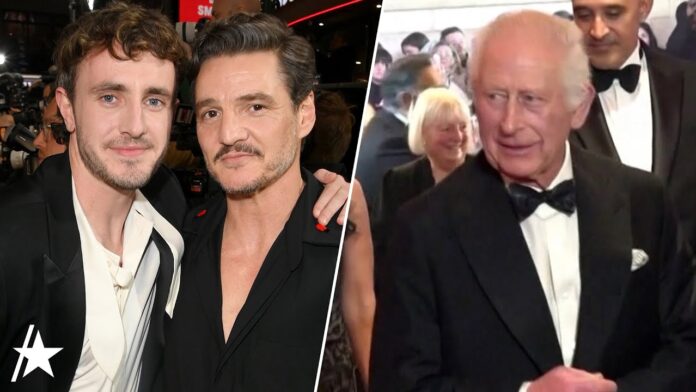The Irish actor’s candid comment about meeting the king sparked debate, but royal experts downplayed any offence.
King Charles III appeared unfazed by Paul Mescal’s brutally honest admission during their encounter at the Gladiator II premiere in London, according to a royal commentator. The Irish actor, who has gained international fame for roles in Normal People and Aftersun, met the monarch on the red carpet during the star-studded event, which coincided with King Charles’ 76th birthday.
In a video shared by Variety, Mescal, a native of County Kildare, offered a refreshingly candid take on meeting the King, saying it “wasn’t on the list of priorities” due to his Irish heritage. Ireland, after all, gained independence from Britain in 1921, following centuries of political and military entanglement, making such encounters historically complex for some Irish nationals. “It’s never something I thought was on the bingo cards,” Mescal said with a smile.
Despite the blunt nature of his remark, Mescal expressed admiration for the significance of the event, particularly for Gladiator II director Ridley Scott. “It’s an amazing thing for Ridley,” he continued, “because I know how important that is for him. So to see his film celebrated in that context was pretty special.”
Mescal’s admission sparked a flurry of online chatter, with some speculating whether his comments might have been poorly received by the King. However, royal commentator Gareth Russell dismissed such concerns as exaggerated. Speaking exclusively to GB News, Russell described the reaction as “overblown,” suggesting that King Charles, who has long advocated for improved Anglo-Irish relations, was unlikely to be offended. “The King is well aware of the complexities surrounding British-Irish history,” Russell explained. “Paul’s comments reflect his national pride, not disrespect.”
The interaction between Mescal and King Charles offered a glimpse into the sometimes awkward dynamics of celebrity and royalty. When asked about the conversation he shared with the King, Mescal admitted, “You just kind of nod along… I found it kind of hard to hear what he was saying because your head is in such a frenzy.” His candour about the moment—equal parts surreal and nerve-wracking—resonated with many, adding a touch of relatability to the glittering event.
King Charles, who has demonstrated a measured and modern approach to his royal duties, is known for engaging with individuals from various cultural backgrounds. His reign has already seen significant efforts to strengthen ties with Ireland, following in the footsteps of Queen Elizabeth II’s historic 2011 state visit. Given this context, it is unsurprising that the monarch would take Mescal’s comments in stride.
Gladiator II, a much-anticipated sequel to the Oscar-winning 2000 film, brought together Hollywood royalty and actual royalty at the premiere. The film’s star-studded cast, including Mescal and Denzel Washington, turned out to celebrate Ridley Scott’s latest epic. For Scott, having his work recognised in such a high-profile setting was undoubtedly a career highlight, and Mescal’s remarks underscored how deeply the occasion resonated with those involved.
Meanwhile, Mescal’s interaction with King Charles is unlikely to tarnish his rising star. His career continues to ascend, with acclaimed performances that have earned him both critical and commercial success. His honest and light-hearted take on meeting the monarch only adds to his reputation as an actor unafraid to speak his mind.
In a cultural climate where encounters between royalty and celebrities are often scrutinised, Mescal’s straightforward approach offered a refreshing departure from overly polished interactions. The episode serves as a reminder that such meetings are, at their core, human experiences—complete with nerves, humour, and, sometimes, a touch of awkward honesty.
As for King Charles, his response, or lack thereof, suggests that he is more than capable of handling such candour with grace. The moment will likely be remembered not for any perceived slight, but for the way it highlighted the evolving nature of monarchy in the modern world
